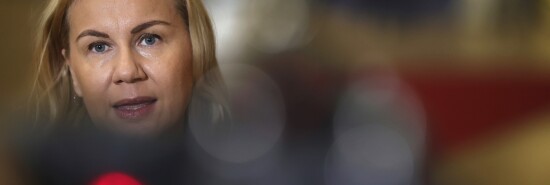
EU to extend gas rationing measures into next winter
Breanne Deppisch
Video Embed
The European Union is planning to extend its gas reduction targets through next winter, leaders said this week, an unpopular but necessary step as the bloc braces for a second winter without Russian fossil fuels.
EU Energy Commissioner Kadri Simson told energy ministers this week that extending the reduction targets is “key” to staying prepared and helping the EU reach its target of 90% gas storage before winter, a goal that she said will remain the same for every winter going forward.
ONE YEAR AFTER RUSSIA’S INVASION OF UKRAINE: AN ENERGY WAR AND MASSIVE DISRUPTION
But the plan will require all 27 member states to agree to voluntarily reduce gas consumption for another 12 months — a request almost certain to spark indignation and pushback from some member states, who nearly threatened to tank the agreement last year.
Leaders eventually reached agreement on a 15% reduction target slated to expire in March.
But even then, it was a high bar to clear due to strong objections from Spain, Greece, Portugal, Italy, and Cyprus, who depend less on Russian supplies.
Germany, on the other hand, wanted the 15% target to be even higher, given its deep dependence on Russian fossil fuels.
And in the months since, neither has softened their arguments.
This week, German State Secretary Sven Giegold again called for higher reduction targets, saying they are important “not only to prolong the current rules” on gas reduction, “[but to make them] tougher, in order to send a signal to the market.”
Czech Industry Minister Jozef Sikela told reporters the same day that the cuts are “technically not repeatable” for another year.
“You cannot force basically the households to heat even less. You cannot force the industry to produce less,” he warned.
In a letter to the European Commission last summer, Spain’s Environment Minister, Teresa Ribera Rodriguez, criticized the plan as “not efficient, fair or equitable” before calling out Germany directly.
“Unlike other countries, we Spaniards have not lived beyond our means from an energy point of view,” she said.
LNG COMES AT A (BIG) PRICE
So far, Europe has avoided a supply crisis in large part by importing LNG from the U.S., Qatar, and other suppliers.
But those come with a big price tag: Germany paid 109% more to import its gas in 2022, according to data published by its Federal Office of Economic Affairs — accruing a whopping $78.84 billion in costs, despite the fact that it cut its volumes by 30%.
Much of those cuts were imposed in the industrial sector, leading to a slowdown in production, especially from gas-intensive factories.
Chemical producer BASF announced it will close several of its German factories due to the high gas prices, which are “at least double what we are used to,” Chief Financial Officer Hans-Ulrich Engel told Bloomberg.
The company slashed its consumption by roughly one-third in Europe and still incurred $2.1 billion in additional costs, he said.
WRITING ON THE WALL?
A report last month warned that Europe, in a best-case scenario, will need to extend its natural gas consumption by 13% over the next six months to avoid a supply emergency.
If temperatures plummeted or if Russian piped gas were to stop, things would get much worse, according to the report published by the European think tank Bruegel.
If Russia were to cut off all its piped gas to the EU, it would have to up its demand savings to 20%. And in a worst-case scenario, in which temperatures fell and Russia halted supplies, the level of cuts needed to avoid a complete supply emergency would require a 30% reduction.
An IEA report published late last year said Europe could see a supply-demand gap of as much as 30 billion cubic meters in 2023 due to higher demand from China and beginning the refill process without Russian supply.
CLICK HERE TO READ MORE FROM THE WASHINGTON EXAMINER
The bloc benefited from low Chinese demand and Russian gas flows that filled its tanks through the first half of the year, it said — warning there could be a more difficult road ahead.
“Europe’s gas supply-demand balance will remain a tightrope walk for the next two years,” IEA Director Fatih Birol said in a statement. “With the recent mild weather and lower gas prices, there is a danger of complacency creeping into the conversation … but we are by no means out of the woods yet.”
